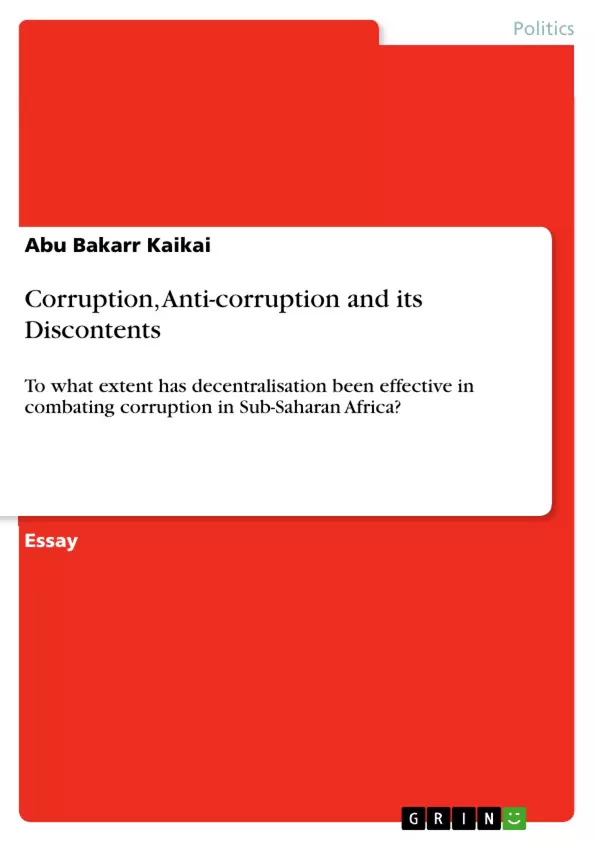Given the conflicting ideas surrounding the impacts of decentralisation as predicted, this essay argues that while decentralisation may have contributed to improving good governance in certain countries around the world, the contrary holds for sub-Saharan countries. Thus, this essay explores the extent at which decentralisation has contributed to fighting corruption in the sub-Sahara.
Overwhelmed by bad governance, an eyesore of poverty and disease, the relics of prolong corruption and misrule have pushed developing countries in sub-Saharan Africa and their counterparts, the World Bank (WB) and International Monetary Fund (IMF) into political, administrative and economic reforms. Since the 1990s, decentralisation has been a key policy instrument advocated and favoured by governments, donor countries, civil society and international institutions to engender good governance. Many countries in Africa have speedily implemented political, administrative and fiscal decentralisation within the last three decades (Conyers 2007; Dickovick and Wunsch 2014). The primary or perhaps the profound motivation for the wave of decentralisation around the world, particularly in sub-Saharan, is based on the conceptual argument that it offers potential benefits. According to proponents, in a decentralised governance system where power and resources are devolved, services will increase alongside efficiency. Productive and economic growth will inhibit rent-seeking, encouraging downward accountability to promote civic participation in decision-making. This will eventually alleviate poverty and reduce corruption. It is expected that where these goals are achieved, the level of human development index will rise in sub-Saharan Africa.
In spite of the hypothetical rationale for adopting decentralised policy, there are several scholars and academics that are pessimistic and cynical about the concept. Tulchin et al. (2004) for instance, argues that due to the complex and fluid nature of decentralisation, it is highly unlikely to determine the actual outcome against expectation. To qualify this statement, Wunsch (2008) writes that evidence of decentralisation across Africa over the years has been frustrating. However, some evidence suggests that there have been improvement in service delivery in certain countries within this region. Although Conyers (2007:27) caution that is it hard to ascertain whether decentralisation contributed to the progress.
Inhaltsverzeichnis (Table of Contents)
- Introduction
- Theories of decentralisation
- Criticism of decentralisation
- Decentralisation in sub-Saharan Africa
- Independence and statism
- Reforms in sub-Saharan Africa countries
- Barriers to implementing successful decentralisation in sub-Saharan Africa
- Has decentralisation reduced corruption?
- Conclusion
Zielsetzung und Themenschwerpunkte (Objectives and Key Themes)
This essay examines the extent to which decentralization has contributed to combating corruption in sub-Saharan Africa. It analyzes the theoretical arguments for and against decentralization and reviews the historical context of decentralization in the region. The essay also explores the potential impact of decentralization on corruption, considering both positive and negative perspectives.
- Theories of decentralization and its potential benefits for good governance, poverty reduction, and corruption reduction.
- The historical context of decentralization in sub-Saharan Africa, including the motivations behind its adoption and the challenges faced in implementation.
- The impact of decentralization on corruption in sub-Saharan Africa, considering both potential positive and negative effects.
- The role of political competition, citizen participation, and local capacity in shaping the success of decentralization.
- The challenges and complexities of measuring the effectiveness of decentralization in combating corruption.
Zusammenfassung der Kapitel (Chapter Summaries)
The introduction provides an overview of the essay's purpose and scope, highlighting the importance of decentralization in addressing governance challenges in sub-Saharan Africa. It discusses the theoretical arguments for and against decentralization, emphasizing the potential benefits and challenges associated with this policy approach.
The chapter on theories of decentralization explores the conceptual framework surrounding decentralization, highlighting the expectations and potential impacts on good governance, political accountability, and participation. It examines the perspectives of various scholars and institutions, including the World Bank, and analyzes the potential for decentralization to promote economic development and political stability.
The chapter on decentralization in sub-Saharan Africa focuses on the historical context of decentralization in the region, tracing its evolution from independence to the present day. It discusses the motivations behind decentralization reforms and the challenges faced in implementation, considering factors such as political instability, weak local capacity, and corruption.
The chapter on the impact of decentralization on combating corruption delves into the potential effects of decentralization on corruption levels in sub-Saharan Africa. It examines both the potential positive effects, such as increased accountability and transparency, as well as the potential negative effects, such as increased opportunities for local corruption.
Schlüsselwörter (Keywords)
Decentralization, corruption, sub-Saharan Africa, good governance, political accountability, citizen participation, local capacity, economic development, political stability, World Bank, International Monetary Fund, rent-seeking.
- Arbeit zitieren
- Abu Bakarr Kaikai (Autor:in), 2015, Corruption, Anti-corruption and its Discontents, München, GRIN Verlag, https://www.grin.com/document/342878



